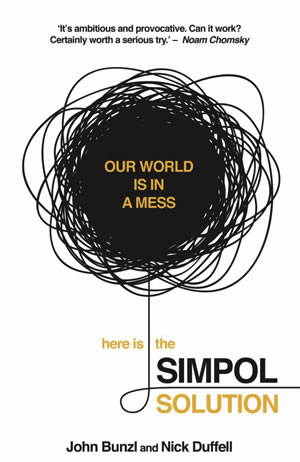When it comes to practical action aimed at sustainability, it’s fair to say that local action has traditionally been the priority for the many thousands of NGOs and activist groups that make up the Global Justice Movement. In 1973 Fritz Schumacher’s world-famous book, Small Is Beautiful, established this orientation towards a smaller, more human scale, and ever since, local, small-scale, personal responses have seemed right. “Think globally, act locally” became our movement’s clarion call.
But now, nearly 50 years on, in a world where the scale of almost everything – from economic markets to ‘big data’ – has gone global and is running out of control, does this orientation still make sense? Has it brought sustainability and social justice? Despite some small successes, sadly, the honest answer has to be ‘no’. No serious dent has been made in the globalising neoliberal juggernaut; climate change remains substantially unaddressed; wealth inequality continues to grow; and the environment continues to be degraded at an alarming pace.
In our new book, The Simpol Solution: Solving Global Problems Could Be Easier Than We Think, we suggest that a new and global political strategy is urgently needed – one that goes far beyond transnational protest and lobbying. For too long we’ve pitted the global as being against the local, in the belief that local action was the only way to ‘be the change’. But in today’s world, as our book argues, that way of thinking imprisons us in the same old polarised ‘either-or’ oppositional thinking-trap that prevents us from conceiving of genuinely holistic ‘both-and’ solutions. A ‘both-and’ worldview dissolves this duality, as global and local become complementary and mutually reinforcing. Simpol strategy offers a broad, non-polarised, ‘both-and’ orientation, which recognises that the global, systemic nature of our problems requires a global, coordinated political approach that both supports and enables local action.
“Think globally, act locally and globally” should be our new mantra. This isn’t just a gimmick. Once we recognise the key underlying dynamic that’s fuelling the global neoliberal juggernaut, the need for global action becomes obvious. Take almost any global problem – from climate change to wealth inequality, or from excessive corporate power to tax havens – and we find that they all share a common barrier: that unilateral action by any nation to solve or ameliorate them would cause that nation an economic competitive disadvantage. Solving these problems inevitably means tighter regulations on business, and higher taxes for the rich and corporations.
We may think this logical and desirable, but any government that did so would see business, investment and thousands of jobs move elsewhere. Its economy would suffer, the currency would slide, and the next election would be lost. It’s little wonder that governments aren’t taking action. The underlying factor, then, is every nation’s fear of moving first: a vicious circle that in the book we call ‘Destructive Global Competition’ (DGC).
One of the ways we, as a movement, have become complicit in the problem is by denying the reality of DGC. We pretend that going green will make our economy more competitive, and shut our eyes to our nation’s fear of losing international competitiveness. Investment in new green technologies, we tell ourselves, will be the way for our national economy to lead the world and bring back jobs to Britain. While this may be true in limited circumstances – such as wind power generation – it’s folly to pretend it is true generally. Under the current market conditions, any new technology will inevitably end up being manufactured wherever labour is cheapest, so the only long-term beneficiary in most cases will be China.
The other way we’ve engaged with international competitiveness has been well-meaning but inadequate: by hoping that international agreements such as the 2015 Paris climate agreement will be sufficient. The correct theory is that if all governments act together no one suffers a competitive disadvantage. So the Paris agreement is a step in the right direction; but it contains two fatal flaws. First, nations with the most emissions to cut, such as China, have more to lose than others, so the chances of them actually implementing the agreement are small. Second, there’s no direct electoral pressure on governments to deliver on their commitments. No government will lose any votes for protecting its national interest by not enforcing extra costly regulatory measures. While DGC holds sway, such agreements predictably end up being worth little more than the paper they’re printed on.
How might fully acknowledging DGC change the game for the Global Justice Movement? Crucially, we would recognise that it’s not that governments don’t want to act on the problems and injustices we care about, but that their paramount need to keep their economies internationally competitive means that they can’t. In failing to recognise and take on board the reality of DGC, we have effectively ignored the key barrier that prevents global problems from being solved. Protest and lobby as much as we like, the sad reality is that governments will not act against their own national economic interests.
That’s not to say governments can’t take any steps in the right direction. Only that, when it comes to the really urgent big strides, they’re stuck – and time is running out. Our principal enemy, then, is not so much lax governments or rapacious corporations – though these exist too – but the systemic vicious circle of DGC that governments, corporations and citizens alike are caught in.
Now, it’s back to basics: a global vicious circle can only be combated by action on the same scale – which is what The Simpol Solution proposes. Simpol – the Simultaneous Policy – is a range of global problem-solving policies to be implemented by all or sufficient nations simultaneously. Simultaneously, because only in this way can the vicious circle of DGC be eliminated. Simultaneous action means every nation wins. By supporting Simpol, citizens around the world inform their politicians that they’ll be giving strong voting preference in all future national elections to candidates who have signed a pledge to implement Simpol alongside other governments. Those politicians who sign are favoured, while those that refuse risk losing their seats. With many seats and even entire elections often being won or lost on fine margins, Simpol turbo-charges competition between the parties: once one candidate in a constituency signs the pledge, the others often have little choice but to follow.
And it works. In the run-up to the UK General Election in 2015, supporters succeeded in getting over 600 candidates from all the main parties to sign the pledge. Of them, 29 became MPs. In some seats, nearly all the candidates standing signed, meaning that whoever won the seat, Simpol won regardless. In the recent Irish General Election, 14 MPs signed. A number of MEPs have also signed, and the campaign is spreading quickly to other countries.Simpol is a tall order, no doubt. But, as Noam Chomsky said, “Can it work? Certainly worth a serious try.” With governments stuck in their conflicted position and the UN unable to help, do we have anything to lose by supporting it?
We feel it’s a campaign that Fritz Schumacher himself would have endorsed. In fact, far from seeing the global as in opposition to the local, he recognised that both have their place. As he says in Small Is Beautiful, “We need the freedom of lots and lots of small, autonomous units, and, at the same time, the orderliness of large-scale, possibly global, unity and co-ordination.” As we consider our movement, its orientation and mode of action, isn’t it time we took him at his word?







